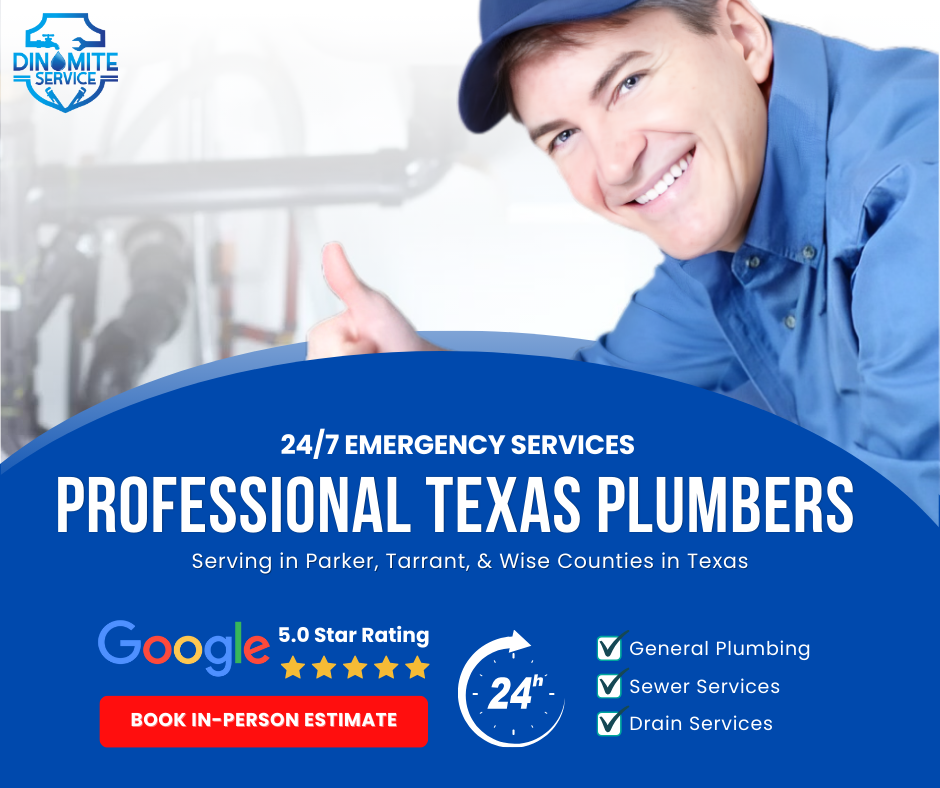How Climate Affects Tankless Water Heater Installation: Choosing the Right Model
- Home
- What to Do in Case of Water Leak Emergency
Recent Posts
- Repairs for Water Leaks With Pressure: 6 Fast & Reliable Fixes
- How to Fix a Loose Faucet Handle in 3 Easy Steps (DIY Guide)
- Kitchen Sink Leaking Underneath? Here’s How to Fix It Fast
- Understanding Texas Water Quality and Hardness Levels By Cities and Zip Code
- Water Heater Permit in Texas: Requirements, Costs & How to Apply
Dinomite Services

When it comes to installing new water heater or replacing an old unit, one of the most crucial factors to consider is your local climate. Whether you live in a cold region with long winters or in a warmer environment, the climate plays a significant role in determining the best model for your home. The right choice can improve energy efficiency, extend the lifespan of your unit, and maintain your comfort levels year-round. Understanding how climate affects tankless water heater performance will help ensure you select the best option for your needs.
Tankless Water Heater Installation in Cold Climates: Key Considerations
If you live in an area with cold winters, ensuring your tankless water heater can withstand freezing temperatures and continue to perform efficiently is essential. Here are the key factors to consider when installing a unit in a cold climate:
Freeze Protection: In regions where temperatures frequently drop below freezing, freeze protection is a vital feature. Some tankless water heaters come equipped with built-in freeze prevention technology, which prevents the internal components from freezing during extreme cold. This helps safeguard the system from damage and ensures that it operates smoothly during winter months.
Energy Efficiency: In colder climates, heating water from a low temperature requires more energy, making the energy efficiency of the unit crucial. Gas-powered tankless water heaters are often more efficient than electric models in cold climates, as they can heat water faster and in larger volumes. Choosing the right type of unit based on your energy needs will help reduce heating costs over time.
Installation Location: Proper placement of the unit is important for avoiding damage from freezing temperatures. Installing your tankless water heater in a location like a basement, garage, or inside the home, where it is protected from direct exposure to the cold, helps maintain efficiency. Choosing an optimal installation spot also prevents unnecessary wear and tear, keeping the unit functioning well for longer.
Antifreeze Technology: Some models come with antifreeze features that help prevent ice buildup in the unit’s pipes and components. These systems are particularly helpful in areas where winter temperatures can dip far below freezing. If you live in such a region, investing in a unit with antifreeze capabilities is a smart choice to protect the system from ice jams.
Tankless Water Heater Installation in Warm Climates: Considerations for Optimal Performance
In warmer climates, installing a tankless water heater may seem less complicated, but there are still several key factors to consider to ensure optimal performance:
-
Electric vs. Gas: In warmer climates, electric tankless water heaters are often favored due to their efficiency and lower installation costs. Since the incoming water temperature is higher in these areas, electric units are better suited to handle moderate temperature changes, providing a reliable and efficient water heating solution without the additional installation costs associated with gas lines.
-
Overheating Protection: Although overheating is less of an issue in warmer climates than freezing, it’s still essential to ensure your tankless water heater has overheating protection. Without this feature, the unit may shut off or become damaged if it exceeds the optimal temperature. Installing the unit in a shaded area or inside the house, where it’s shielded from direct sunlight, helps regulate the temperature and prevent overheating.
-
Sizing and Scalability: One of the most important factors when installing a tankless water heater in any climate is choosing the right size. In warmer climates, an undersized unit may not meet your household’s demand for hot water, while an oversized unit will waste energy. A properly sized tankless water heater will meet the needs of your family while maximizing efficiency and preventing unnecessary energy consumption.
-
Ventilation: Proper ventilation is key to keeping your tankless water heater running smoothly. Ensuring that there is adequate airflow around the unit will help maintain its efficiency and prevent the unit from overheating. Proper venting is particularly important in warmer climates, where high ambient temperatures can affect system performance.
Year-Round Maintenance Tips for Tankless Water Heaters
Regardless of your climate, maintaining your tankless water heater year-round is crucial for ensuring it remains in good working order. Follow these essential maintenance tips to keep your system running efficiently:
Schedule Regular Inspections: Regular maintenance and inspections are essential for spotting potential issues before they become major problems. Annual checkups by a professional will help keep your water heater in top condition, reducing the risk of breakdowns during peak usage times.
Flush the System Regularly: Over time, minerals and debris can accumulate in your tankless water heater, especially in areas with hard water. Flushing the system once a year helps clear out any buildup and ensures that water flows freely through the unit. This process can improve efficiency and extend the lifespan of the heater.
Insulate the System and Pipes: Insulating both the heater and the connected pipes helps minimize heat loss, improving the overall performance of the system. This is particularly beneficial in cold climates, where maintaining the temperature of the water during transit through the pipes is crucial.
Prepare for Emergency Situations: In regions where extreme weather conditions are a concern, preparing for emergencies is essential. Knowing how to drain the system in the event of a freeze or major storm can help prevent costly damage to your heater. A quick response can save the system from freezing and ensure that it’s ready to operate when you need it most.
By following these essential year-round maintenance tips, you can ensure that your tankless water heater operates efficiently and lasts longer. Regular inspections, flushing, insulation, and emergency preparedness are all simple yet effective ways to avoid costly repairs and ensure consistent hot water when you need it most. For expert care, reach out to tankless water heater technicians who can help keep your system in top shape.
Long-Term Benefits of Choosing the Right Tankless Water Heater for Your Climate
Investing in the right tankless water heater for your climate doesn’t just provide immediate comfort—it offers long-term advantages that improve both your home’s energy efficiency and its value:
Improved Comfort: A properly installed and climate-suited tankless water heater ensures that your home will have a steady and reliable supply of hot water, regardless of the weather. This on-demand heating method minimizes energy loss, ensuring that you’re only paying for the hot water you actually use.
Energy Savings: Tankless water heaters are known for their energy efficiency, which can lead to substantial savings over time. Unlike traditional water heaters, which keep water hot in a tank, tankless models only heat water as needed. This on-demand heating reduces energy waste and ensures that you’re only paying for the hot water you use.
Increased Property Value: Homes equipped with energy-efficient features like tankless water heaters are becoming increasingly desirable to homebuyers. Not only do these systems help lower utility bills, but they also reduce the home’s environmental impact. Installing a tankless water heater is an investment that can increase the resale value of your home.
Final Thoughts: Make an Informed Decision for Long-Term Comfort and Savings
Choosing the right tankless water heater for your climate is an important decision that requires careful consideration of both short-term and long-term needs. By selecting a model that is tailored to your local environment, you can ensure consistent comfort, energy efficiency, and lower utility costs for years to come.
For expert guidance and professional installation, water heater installers and water treatment professionals can help you navigate the selection and installation process. With their expertise, you can choose the perfect system for your home, taking into account factors such as energy efficiency, climate-specific features, and proper sizing.

